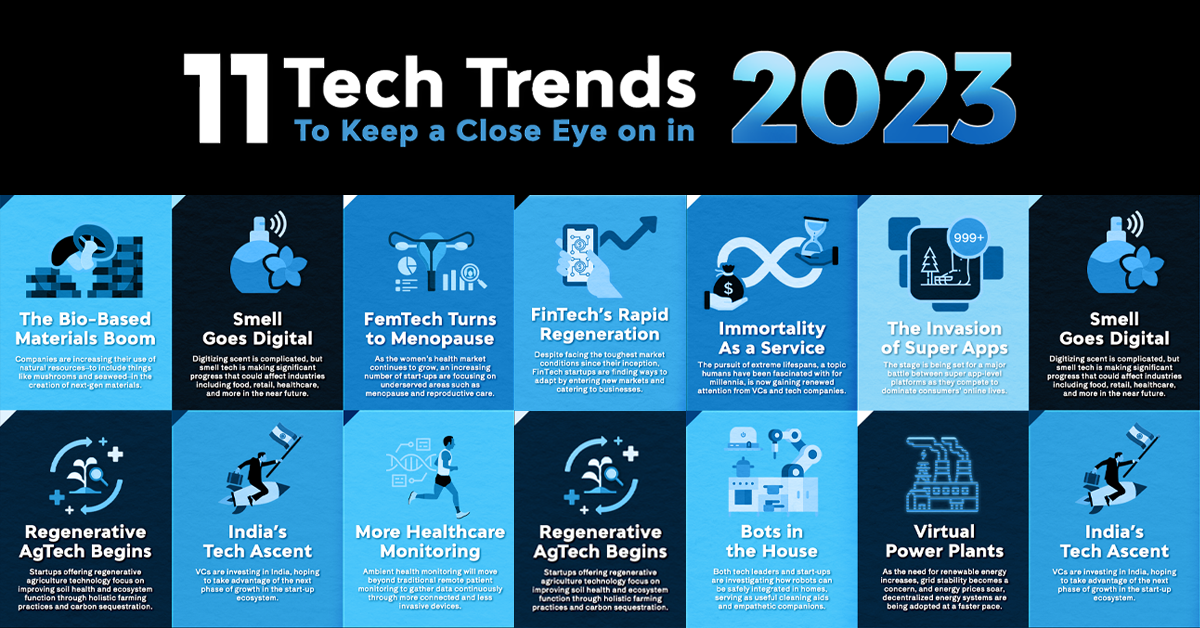Introduction
In today's rapidly evolving world, technology continues to
push boundaries and shape our future. From artificial intelligence to augmented
reality, breakthrough innovations are transforming the way we live and work. In
this blog, we will delve into the exciting upcoming trends in technology that
are poised to make a significant impact in the near future.
1. Artificial Intelligence (AI) Advancements
Artificial Intelligence has already revolutionized various
industries, and its advancements show no signs of slowing down. From machine
learning algorithms to natural language processing, AI is becoming more
sophisticated and capable. We can expect AI to play a crucial role in areas
like healthcare, autonomous vehicles, and personalized customer experiences.
2. Internet of Things (IoT) Expansion
The Internet of Things has paved the way for a connected
world, and its expansion is set to bring about even more interconnectedness.
With the increasing number of devices and sensors, IoT applications will become
more prevalent in our daily lives. Smart homes, smart cities, and smart
industries are just a few examples of how IoT will transform the way we
interact with our environment.
3. 5G Connectivity
The arrival of 5G networks is set to revolutionize the speed
and reliability of our internet connections. With significantly faster download
and upload speeds, 5G will enable innovations such as autonomous vehicles,
remote surgeries, and seamless virtual reality experiences. The widespread
adoption of 5G will reshape industries and open up new possibilities for
communication and collaboration.
4. Edge Computing
Edge computing brings processing power closer to the source
of data, reducing latency and enhancing real-time capabilities. This technology
allows for faster data analysis and decision-making, making it ideal for
applications like autonomous systems, smart cities, and industrial automation.
Edge computing will play a vital role in enabling the massive growth of IoT
devices and managing the vast amount of data they generate.
5. Extended Reality (XR)
Extended Reality encompasses virtual reality (VR), augmented
reality (AR), and mixed reality (MR). These immersive technologies are expected
to reach new heights in the coming years. From immersive gaming experiences to
interactive training simulations and virtual travel, XR has the potential to
revolutionize entertainment, education, and various industries.
Conclusion
The future of technology is brimming with exciting
possibilities. As we embrace these upcoming trends, we can anticipate
significant transformations across industries, enhancing our lives in ways we
couldn't have imagined before. From the seamless connectivity of 5G to the
power of AI and the immersive experiences of XR, these technological
advancements are set to shape our future for the better.
So, fasten your seatbelts and get ready to embark on this
incredible journey into the future, where the possibilities are endless and
innovation knows no bounds.
Frequently Asked Questions (FAQs)
1. What is
the significance of AI in technology? AI enables machines to mimic human
intelligence, leading to automation, personalized experiences, and improved
decision-making across industries.
2. How will
5G impact our daily lives? 5G will revolutionize our internet connectivity,
enabling faster download speeds, seamless streaming, and empowering
technologies like autonomous vehicles and remote surgeries.
3. What is
the difference between AR, VR, and MR? Augmented Reality (AR) overlays digital
information onto the real world, Virtual Reality (VR) creates a simulated
environment, and Mixed Reality (MR) blends digital content with the physical
world.
4. How does
IoT contribute to a connected world? IoT connects everyday objects to the
internet, allowing them to send and receive data, automate tasks, and enhance
efficiency and convenience in various domains.
5. What are
the advantages of edge computing? Edge computing reduces latency and enhances
real-time capabilities by bringing data processing closer to the source. It
enables faster data analysis, reduced network traffic, and improved security
and privacy. Edge computing is especially beneficial for applications that
require quick decision-making, such as autonomous systems and industrial
automation.
6. What
industries will benefit from these upcoming technology trends? The upcoming
technology trends will have a significant impact on various industries,
including healthcare, transportation, manufacturing, entertainment, education,
and retail. These trends will revolutionize processes, improve efficiency, and
create new opportunities for growth and innovation.
7. How can
businesses prepare for these upcoming technology trends? Businesses can stay
ahead of the curve by staying informed about the latest technological
advancements, conducting regular technology audits, and investing in research
and development. Collaboration with technology experts and fostering a culture
of innovation within the organization are also key steps in preparing for the
future.
8. What are
some potential challenges associated with these trends? While these trends
offer tremendous opportunities, challenges such as data privacy and security,
ethical considerations surrounding AI, and the need for infrastructure upgrades
to support 5G and IoT implementations may arise. Addressing these challenges
requires proactive measures and collaboration between stakeholders.
9. What role
will cybersecurity play in this technology-driven future? With the increasing
reliance on technology, cybersecurity will play a critical role in safeguarding
data, systems, and infrastructure from potential threats. Strong security
measures, continuous monitoring, and employee education on cybersecurity best
practices will be essential to protect against cyber-attacks.
10. Are these
trends accessible to everyone, regardless of their technical expertise? Yes,
these upcoming technology trends aim to enhance accessibility and usability.
User-friendly interfaces, intuitive designs, and simplified applications will
enable individuals with varying technical expertise to benefit from these
advancements and participate in the digital transformation.
As we eagerly await the future, it's important to embrace
these upcoming trends and their potential to reshape our lives and society. By
staying informed, adapting to change, and harnessing the power of technology,
we can navigate the exciting possibilities that lie ahead.

Comments
Post a Comment